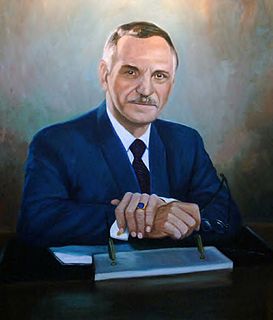A Quote by Henry Giroux
The merging of the military-industrial complex, surveillance state and unbridled corporate power points to the need for strategies that address what is specific about the current warfare and surveillance state and the neoliberal project and how different interests, modes of power, social relations, public pedagogies and economic configurations come together to shape its politics.
Quote Topics
Related Quotes
Power is global and politics is local. That must change. We need a new language for understanding new global power formations as well as new international modes of politics to fight them. Social movements must move outside of national boundaries and join with others across the globe to fight the savagery of neoliberal global politics and central to such a task is the work of intellectuals, artists, cultural workers, and others who can fashion new tools and social movements in the fight against the current anti-democratic threats being imposed all over the globe.
Politics is about power. It is about the power of the state. It is about the power of the state as applied to individuals, the society in which they live and the economy in which they work. Most critically, our responsibility in this parliament is how that power is used: whether it is used for the benefit of the few or the many.
There is a need to employ public memory, critical theory, and other intellectual archives and resources to expose the crimes of those market-driven criminogenc regimes of power that now run the commanding institutions of society, with particular emphasis on how they have transformed the welfare state into a warfare state.
It is unfortunately none too well understood that, just as the State has no money of its own, so it has no power of its own. All the power it has is what society gives it, plus what it confiscates from time to time on one pretext or another, there is no other source from which State power can be drawn. Therefore every assumption of State power, whether by gift or seizure leaves society with so much less power; there is never, nor can be, any strengthening of State power without a corresponding and roughly equivalent depletion of social power.
The illegitimate use of a state by economic interests for their own ends is based upon a preexisting illegitimate power of the state to enrich some persons at the expense of others. Eliminate that illegitimate power of giving differential economic benefits and you eliminate or drastically restrict the motive for wanting political influence.
A state that denies its citizens their basic rights becomes a danger to its neighbors as well: internal arbitrary rule will be reflected in arbitrary external relations. The suppression of public opinion, the abolition of public competition for power and its public exercise opens the way for the state power to arm itself in any way it sees fit.... A state that does not hesitate to lie to its own people will not hesitate to lie to other states.
For authoritarians such as Lenin and Žižek, the dichotomy in politics is state power or no power, but I refuse to concede that these are the only options. Genuine politics is about the movement between these poles, and it takes place through the creation of what I call "interstitial distance" within the state.
Economics now drives politics. This gives us a system in which the relationship between power and politics is no longer fused. Power is global. We have an elite that now floats in global flows. It could care less about the nation-state, and it could care less about traditional forms of politics. Hence, it makes no political concessions whatsoever. It attacks unions, it attacks public schools, it attacks public goods. It doesn't believe in the social contract.
The Internet may well disempower the nation state, but at the same time, it also strengthens certain specific state functions - like surveillance. As a political entity, it doesn't empower the nation sate. It creates the availability of much more data than the digestive system of the nation state could possibly assimilate.































